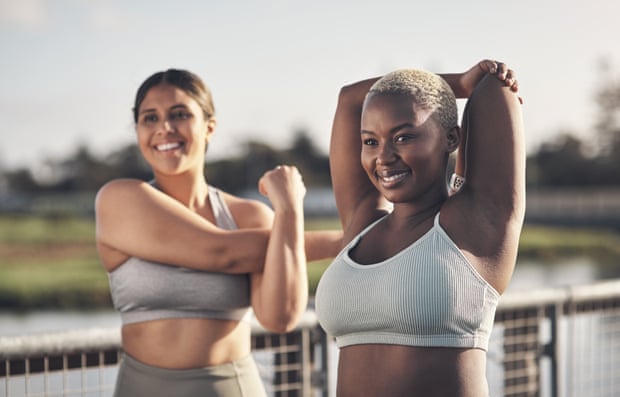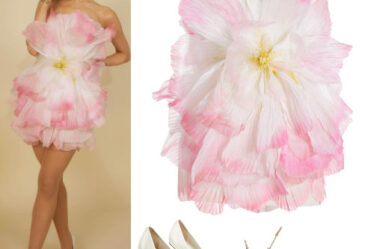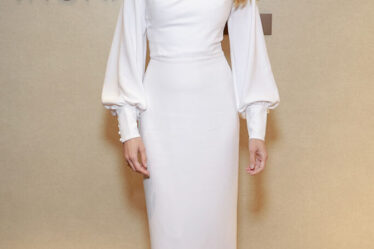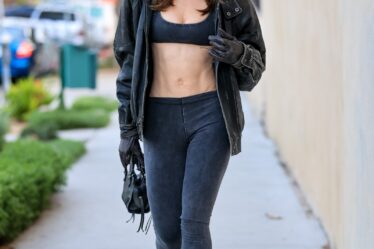
Whether or not it was the prescription sports bras that led the Lionesses to victory on Sunday night, the term remains “a new and under-reported phrase for a lot of women playing sport or doing exercise”, says Priya Downes, founder of sustainable underwear brand Nudea.
A step up from a regular bra fitting, a “sports bra prescription” is comparable to the sort of gait analysis you might get when buying a running shoe: watching how a player moves and then matching them with the right type and size of bra. In the case of England’s winning goalscorer Chloe Kelly, this appears to be a Nike Dri-Fit Swoosh, which she plans to frame.
When buying sports bras, most of us tend to choose the off-the-shelf compression kind. Designed to prevent movement by flattening the breasts and pulling them close to the body, they come in a range of sizes “but are not designed to have the perfect fit, so [it’s not surprising] a lot of professional sportswomen get their sports bras fitted,” adds Downes. “It’s just that we don’t normally see them on the big screen.”
The Lionesses had access to the “breast biomechanic” Prof Joanna Wakefield-Scurr and the English Institute of Sport; in lieu of that sort of access, here are five ways to get the next best thing to a prescription sports bra
Get fitted more than once
“To get the right size, your best bet is trying on as many as possible,” says Downes. “Your boobs change continually. Most of us go through six different sizes in our lifetime. It’s worth getting yourself fitted throughout your life rather than just sticking with the same size for ever.” Compression bras are made from a heavy microfibre so “they’re designed to cover part of your rib cage as well as your boobs, and they’re incredibly stretchy, which is good if your boobs change”, but sometimes, she adds, “we need something a bit more suited to our own body type”.
Don’t just follow your traditional bra size
“It’s not necessarily about the cup size,” advises Laura Franklin, Bravissimo’s fitting expert. Downes, meanwhile, says 80% of the support comes from the back band – the fitted strip of fabric that runs under your boobs. This is the most important part of a sports bra, “so it’s essential to make sure that fits correctly to prevent any injuries and minimise the movement,” she says. “If it feels a little tight, verging on uncomfortable, then it’s the right size.”
Consider adjustable straps
“These are surprisingly hard to find on a sports bra, and you certainly won’t see them on a regular [compression] kind, but if you have a fuller bust or a small back and large bust, it’s really worth looking for a bra with them,” says Downes. The focus is comfort, as well as support. “They shouldn’t be digging in, because they shouldn’t take the weight of the boobs,” she says. Equally, if you’re getting red marks when you’ve taken it off, “that’s the wrong size, too”.
Choose a bra suited to your form of exercise
“What works for something high-impact like football or running might not be necessary for something like yoga or pilates,” says Downes. Most sports bras are made with microfibres and synthetic fabrics, which wick sweat better than slow-drying cotton. But sweat-wicking is not the priority with something like pilates. “You don’t need full-grade-stretch, industrial-strength microfibre; you just want a bit of give,” she says. Franklin recommends something soft with a wrap front, and thinking in terms of light support rather than, say, binding. Downes suggests ribbed cotton, or Tencel, which has a bit of stretch. “No one wants to be uncomfortable doing downward dog.”
Even small-chested women need to wear one
“Bras are necessary for all women, regardless of their cup size,” says Charlotte Morgan, senior womenswear designer at independent activewear brand AYBL. “Without the right support, the ligaments in your breasts can stretch and, over time, be susceptible to irreversible damage.”
Can you ever wear two bras instead?
Got to the pitch but you’ve forgotten your sports bra? “I mean, you could double up and wear two bras together, if that was available to you,” says Downes. “But again, it comes down to the fitting.” If one of them is an underwire, though, forget it: “Underwires will inhibit your performance,” says Morgan. Downes agrees: “Two wrongs don’t make a right, and the same goes for badly fitting bras.”



